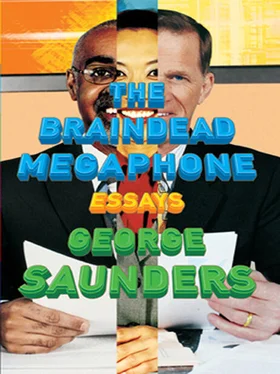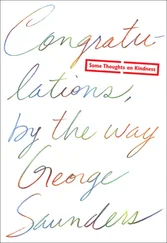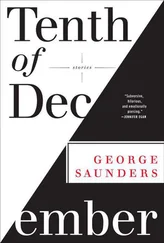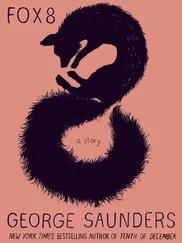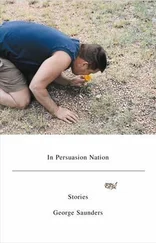“One day,” he tells us, “we had a discussion in class. They asked me, where did they go? The trees, the salamander, the tropical fish, Edgar, the poppas and mommas, Matthew and Tony, where did they go? And I said, I don’t know, I don’t know. And they said, who knows? and I said, nobody knows.”
So there’s a possible ending, right? He’s turned to look back at his pattern, he’s addressed it — he’s wryly yet earnestly commented on it, saying a true thing: nobody knows why death happens. It’s not bad. But it’s not great. One can almost feel Barthelme squirming under the not-greatness of it, then pushing discontentedly onward, feeling around with his most substantial tool: the devastating adroitness of his language. Our narrator continues: “And they said, is death that which gives meaning to life?” (We notice this weird, illogical elevation of diction — three lines ago these kids were still saying “poppas and mommas.”) “And I said, no, life is that which gives meaning to life.” (We like that the narrator doesn’t balk at his students’ sudden new articulateness — he doesn’t even acknowledge it — maybe, it occurs to us, they talk like this all the time?) “Then they said, but isn’t death, considered as a fundamental datum, the means by which the taken-for-granted—”
Whoa, we think, slow down, they’re now talking in an even more elevated—
“…mundanity of the everyday may be transcended in the direction of—”
What’s happening here, I think, is that Barthelme’s mind has gotten tired of being polite. Without worrying about whether it’s allowed, or will be understood, or is logical within the world of the story (or whether the workshop will tolerate it), he races off in the direction his logic is taking him, appropriate diction be damned, trying to get the story to answer the questions the thing’s been asking all along: What are we to make of death? How are we to live in a world where death is king?
We follow because we find his courage thrilling.
Does he then use this new allowance we’ve granted him — this expanded diction — to glibly wrap the story up on some cool philosophical basis? (“Then little Sally Adams posited that, what manifested to them as mundanity could also be understood as simply as an example of Brugenheiser’s ‘vantage conundrum,’ at which time the bell rang, and they bolted from their desks, well-satisfied with Sally’s explanation, and our day was done, as all our days, eventually, will be done, for all of us, for good.”)
No, thank God, he does not.
He escalates again. The students (still in professorial diction) request that he make love with Helen. Where does this come from? Until just now, there was no Helen. Sorry, Don’s in a hurry, and can’t/won’t explain it to us, except to let us know, parenthetically, that Helen is “our teaching assistant.” “Come on, come on!” he seems to be saying. “It surprised me too! Just keep up!”
Will they do it? Will the narrator and Helen make love? The reader honestly doesn’t know, but does care. The narrator demurs: “I said I would be fired and that it was never, or almost never, done as a demonstration.” (The “or almost never” is a fine little gas station.)
And then the reader (this reader, anyway) falls, once and for all, forever, in love with this story, at the line: “Helen looked out of the window.” Why? Well, for one thing, Helen wants to do it, and will do it, in front of the class, gladly, if only The Narrator will ask. She has loved him all along. A few lines ago we didn’t even know Helen existed, but we do now, and so does The Narrator, and the small voice in our mind that has all along been registering that The Narrator has no personal life in this story, that there are no real human emotions in the story, that this alleged story is just a pattern, is assuaged: this is now, writ small, a love story. It’s a love story! We see Helen plainly, her sensible shoes, the red-ink stains on her young hands, which she wrings every evening in her tiny, under-furnished, teacher’s assistant apartment, dreaming of a life with The Narrrator. But Helen is shy! She doesn’t want to demand anything! She’s not a pushy girl, our Helen—
But also — there is no Helen. Or, there’s barely a Helen. Helen has only existed for four short paragraphs, and already she represents quiet, faithful, unrequited love. Our pleasure in Helen is, partly, also pleasure in Barthelme’s incredible economy.
Little four-paragraph Helen sits, drumming her ink-stained fingers, gazing out the window, waiting, hoping…
The children press their case, and we see that making love with Helen would be a real win/win/win; not only would Helen like it, The Narrator seems kind of lonely, and it would also be good, you know, for the kids (“We require an assertion of value,” they plead, “we are frightened.”).
Weirdly, we are really curious, or at least I always am, to see if some lovemaking will in fact break out on this desk somewhere in the desolate, death-besieged Midwest, or what.
We have one long paragraph left.
And look what’s happened: suddenly, Barthelme can end this thing any way he pleases. The essential work has been done. If the narrator begins making love to Helen, that’s good. If he declines, also good. The air is charged with meaning. It is everywhere we look. It seems he’s going to pass — he kisses Helen on the brow — but we sense that he and Helen may very soon be demonstrating some lovemaking, if only to one another, possibly in Helen’s sparse apartment. Everything has changed between them. Suddenly there is death in the room, but also life, and love.
The reader is satisfied: so much has happened, in so short a time and in such an unexpected way. It could end with a simple line: “I looked at Helen, and she looked at me.”
But Barthelme, being great, abides long enough to produce from his sleeve one last escalation which, Barthelme being Barthelme, arrives in the person (?) of a gerbil.
Where does the gerbil come from? How did it find the classroom? And why is it a gerbil and not (if we are seeking circularity) an orange tree, or at least a snake? How did it knock on the door? Doesn’t it know this is exactly the wrong class, that soon it will die? Or — who can say? — maybe Helen’s just-revealed love for The Narrator’s love has changed everything, and the gerbil will live, and prosper, and get fat enough to overflow its cage!
It is ambiguous, and it is funny, and somehow perfect: this little expectant rodent, politely waiting for its knock to be answered, all set to die, or to live.
We, like the children, “cheer wildly.”
THE UNITED STATES OF HUCK
INTRODUCTION TO ADVENTURES OF HUCKLEBERRY FINN
INTRODUCTION TO THE INTRODUCTION
Let me begin by confessing that I have had more trouble with this piece than I’ve ever had writing anything in my life, mainly because I love this book and was deathly afraid I would fail to do it justice, which caused me to rush off to the library and do hours and hours of research, which only terrified me further and reduced me to writing quaking tautological sentences like “Much has been written about the fact that much has been written about the fact that, whereas the shores of the Mississippi, mythologically speaking, represent America’s violence, the center of the river, which traditionally has been represented as Utopian, is also occasionally seen to contain bloated floating corpses.” Recognizing that my sentences were perhaps not as clear as they could be, I began furiously editing, bearing in mind at every instant that Adventures of Huckleberry Finn is probably the greatest and certainly the most influential American novel of all time, and has inspired feelings of fierce love and loyalty in every important American writer, except in those other important American writers who have really, really disliked it and found it morally problematic, and soon I had worked myself into such a state of bowing obeisance and timidity that my sentences became a bland series of tenuous apologetic nouns, no verbs at all, as these, I felt, were too risky.
Читать дальше
